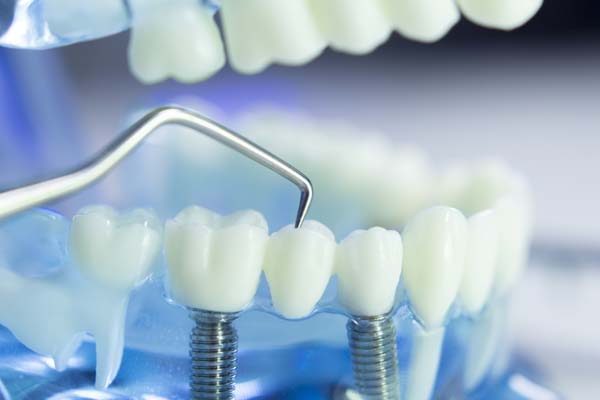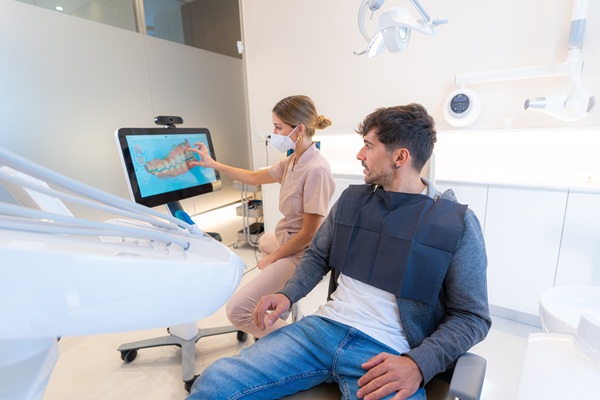Recommended Aftercare for Dental Implants

Getting dental implants can be both exciting and scary for many people. The scary part of it all is the unknown, not understanding the process. Once they learn what is expected, many are surprised at how straightforward the process is from start to finish. One of the biggest questions that many people have is aftercare and treatment of their new implants.
What to expect
After having your dental implants placed, it’s your responsibility to ensure you still practice good oral care of your new smile. If you take care of your implants just as you would natural teeth after they are placed, you can expect them to last for many years. You will be given specific instructions on specifically caring for your dental implants after your procedure, but here are some frequently asked questions that may help you figure out what to expect.
Will there be bleeding after?
You can expect some minor bleeding after you have a dental implant procedure. This is completely normal. Your dentist may give you a gauze pad to help soak up any residual bleeding. They will tell you to bite down firmly on the gauze pad for at least 30 minutes to an hour. You may notice some small bleeding after this. You should just use another gauze pad if needed.
How can to help the healing process
After the dental implants are placed, you will want to avoid rinsing out your mouth, do not attempt to mess with the surgical site by using your tongue or fingers. This can cause additional and unnecessary bleeding. Avoid smoking, using straws, and spitting. These actions can dislodge any blood clots and slow the healing process down.
What about pain relief?
You will experience some mild discomfort after you have your implants placed. Once the anesthetic wears off, you can take either a prescribed medication from your dentist as instructed or an over-the-counter pain reliever. Most patients will find relief in an OTC pain reliever. Any pain you feel following your procedure should gradually subside in a few days.
Oral hygiene after the procedure
Proper oral hygiene is vital to having a successful healing process after your implant procedure. You may be prescribed a chlorhexidine mouthwash by your dentist to rinse your mouth thoroughly. The day after your procedure, you will want to use warm salt water to rinse your mouth. This is typically recommended at least 4 to 5 times a day to help rid your new smile and mouth of any harmful bacteria which could interrupt healing. It’s important to discuss with your dentist their expectations when it comes to brushing your new teeth. Some discourage you from doing it too soon, while others may recommend it. It’s all dependent on your dentist's instructions.
Your new smile is an investment and should be treated as such. It’s important to follow along with your dentists’ instructions on how to provide aftercare following a dental implant placement procedure properly. If you properly care for your new teeth, you can expect them to last for many years.
Request an appointment here: https://www.georgetown-dental.com or call Georgetown Dental Partners at (978) 867-0860 for an appointment in our Georgetown office.
Check out what others are saying about our dental services on Yelp: Dental Implants in Georgetown, MA.
Recent Posts
Looking for information on dental implants? If you have suffered significant tooth loss, but not enough to need a complete arch replacement, you can get a dental bridge supported by dental implants. Implant-supported bridges can provide a reliable, functional, and long-term solution to tooth loss. Unlike traditional bridges or removable partial dentures, a dental implant-supported…
Many dental professionals recommend dental implants restoration after tooth loss. Dental implants offer superior durability and functionality and look just the same as natural teeth. However, some patients are nervous about the success rate of dental implant restoration, and learning more about what the stats say can help you physically and mentally prepare yourself. According to…
Those with one or more missing teeth can choose between tooth replacement options like a dental implants, a traditional bridge, or dentures. Bridges and dentures used to be the norm, but they are not suitable for everyone. Due to reasons like soreness, discomfort, and poor fit, you may need to consider a different tooth replacement…
Dental implants and bridges are two options you get to explore if you have missing teeth. These oral restorations restore the function and appearance of missing teeth in their unique way. Missing teeth can reduce one's confidence. Not replacing lost teeth can also cause the remaining teeth moving out of their proper alignment. This can…


